Tennessee 4-H Congress is one of the state’s premier 4-H events, bringing together high school members to learn about government, citizenship, and leadership. Held at the State Capitol in Nashville, Congress gives youth the chance to step into the role of a legislator by debating bills, holding elections, and experiencing how government works firsthand. Delegates also take part in leadership workshops, recognition programs, and service activities. The purpose of 4-H Congress is to help young people better understand their responsibilities as citizens, strengthen their leadership skills, and celebrate the accomplishments of outstanding 4-H’ers across the state.
78th Annual Tennessee 4-H Congress
March 7-11, 2026
Embassy Suites Nashville SE
Murfreesboro, TN
Intrested in attending 4-H Congress
About 4-H Congress
The purpose of Tennessee 4-H Congress is to help youth grow as leaders, active citizens, and future professionals through meaningful, hands-on experiences.
- Recognize outstanding 4-H members and leaders from across Tennessee.
- Build a stronger understanding of citizenship and how government affects daily life.
- Strengthen leadership, communication, and decision-making skills.
- Provide hands-on learning about how state government works.
- Inspire youth to take on and continue leadership roles in their communities.
- Encourage pride in Tennessee’s history and heritage.
- Prepare young people for future careers through teamwork, public speaking, and civic engagement.
- Each county may send two 4-H senators who are senior Level I members (grades 9–10).
- One senior Level I 4-H representative for every 1,700 members—or a major fraction—of the county’s total enrollment, plus
- One senior Level I 4-H member for every 60—or major fraction—of the county’s senior enrollment.
- All delegates must prepare an essay on the Congress theme, “Tennessee 4-H: Find Your Missing Piece.”
- Each county may also send one volunteer leader. Others who may attend include state 4-H staff, UT Extension administrative personnel, Tennessee 4-H Foundation members, and county Extension staff designated by regional UT Extension personnel to accompany their groups.
- The registration fee for Tennessee 4-H Congress is $330.
- State finalists, regional public speaking winners, State 4-H Congress officers, and volunteer leaders attend on scholarships.
- All registration is handled through your county 4-H office.
- Scholarship opportunities are available, please refer to the registration details section.
Nashville is a city rich in natural beauty, culture, and more than 200 years of history. During Tennessee 4-H Congress, delegates will explore some of the city’s most notable landmarks.
Delegates will visit the Tennessee State Capitol and Legislative Plaza, meet with representatives from their region or district, and tour the Tennessee State Museum. They’ll also have the chance to stroll the historic cobblestone streets of downtown Nashville and enjoy a memorable General Jackson Showboat river cruise on the Cumberland River.
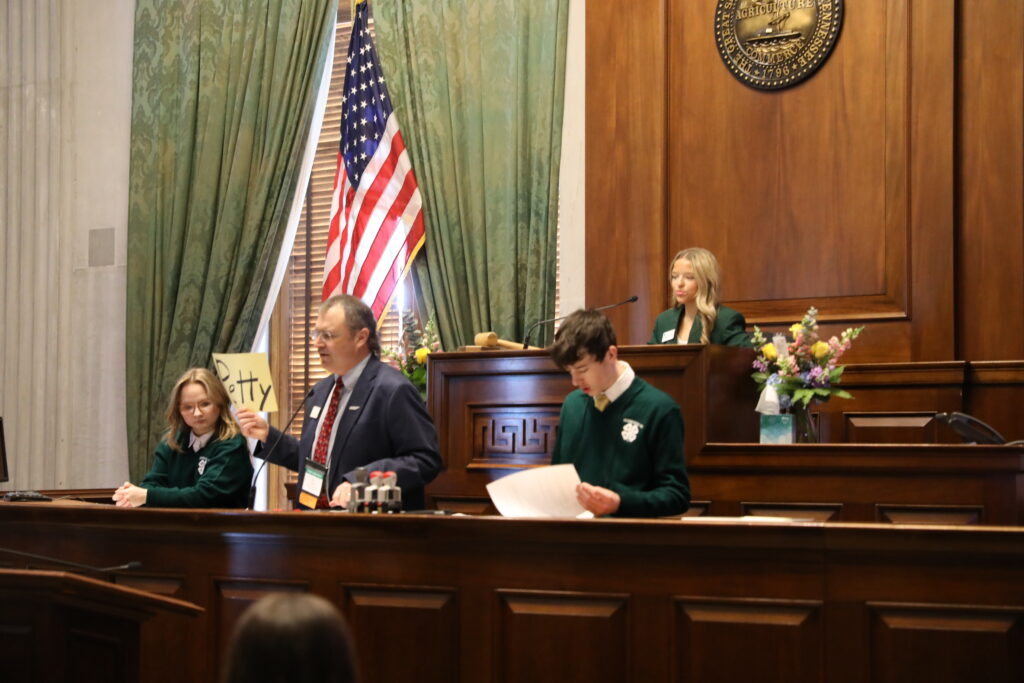
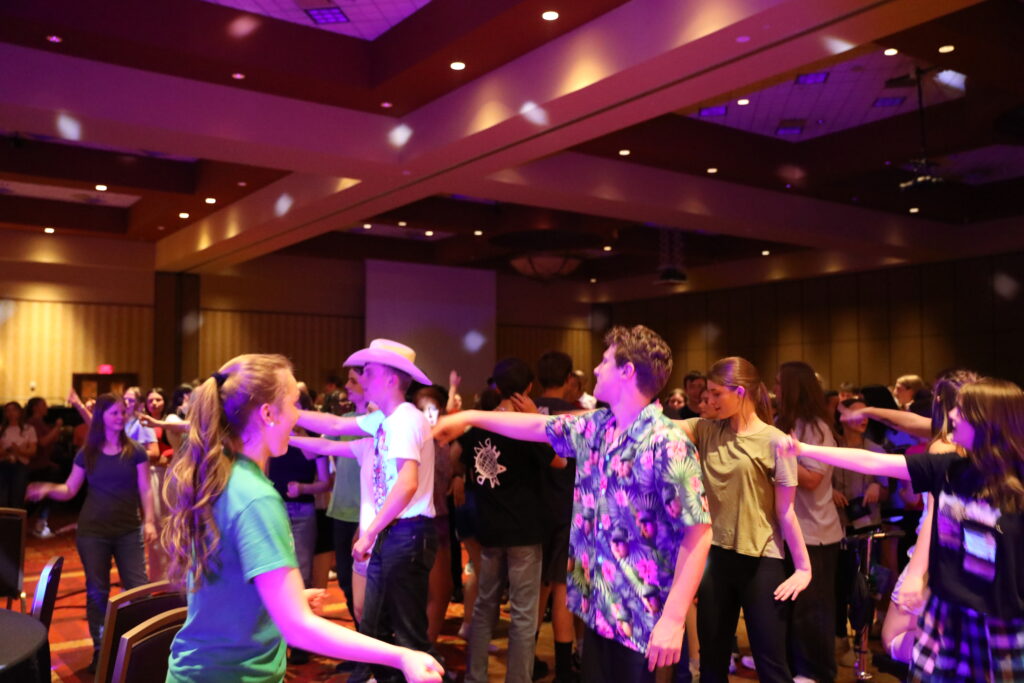
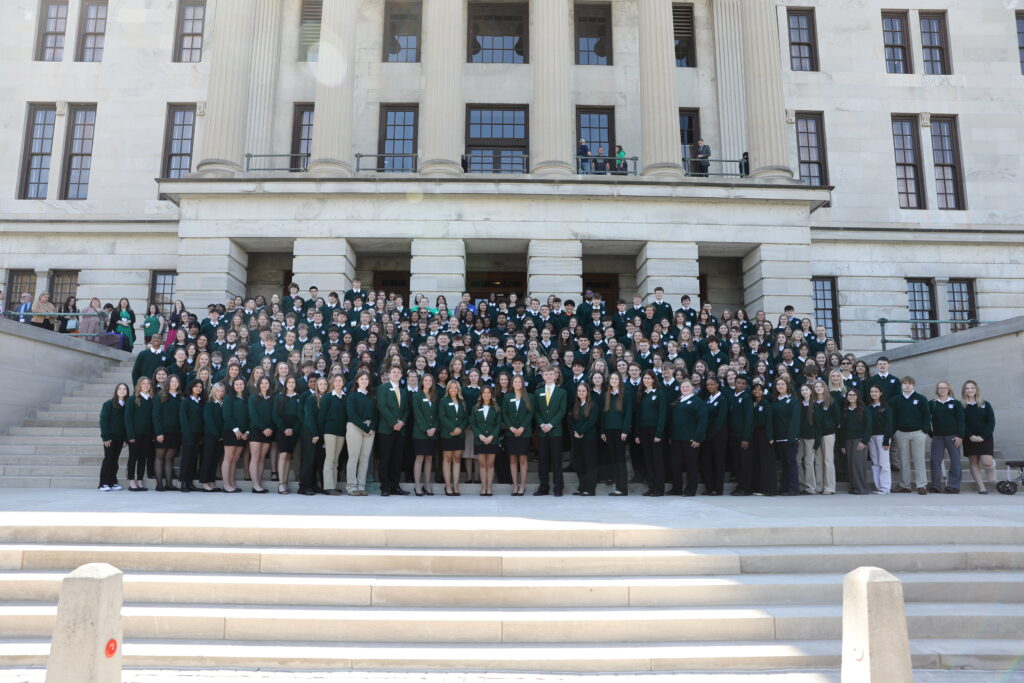

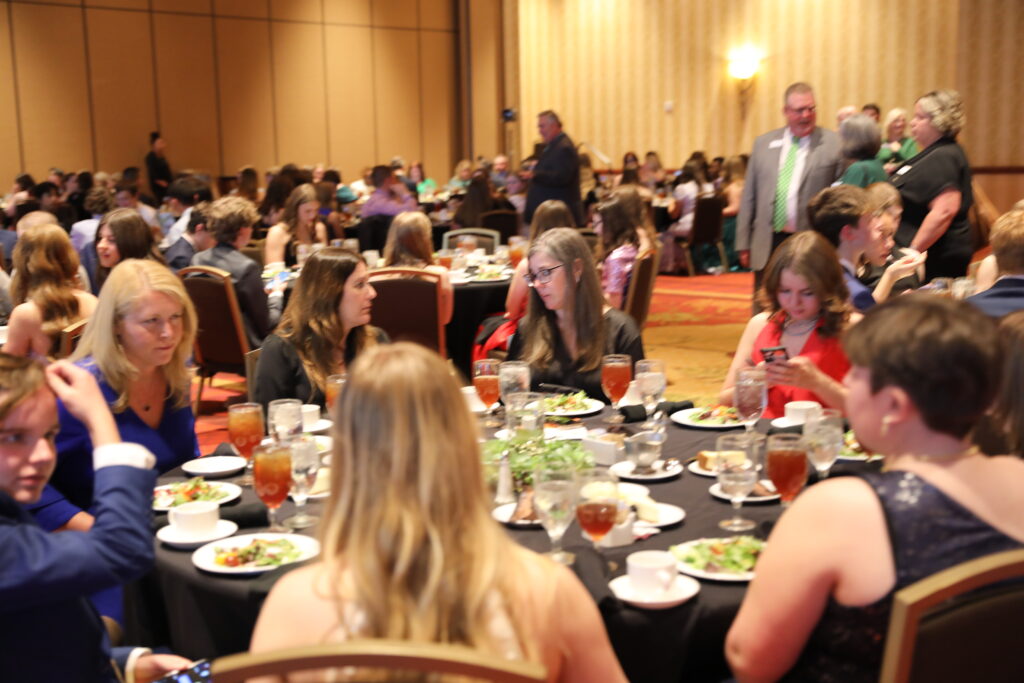
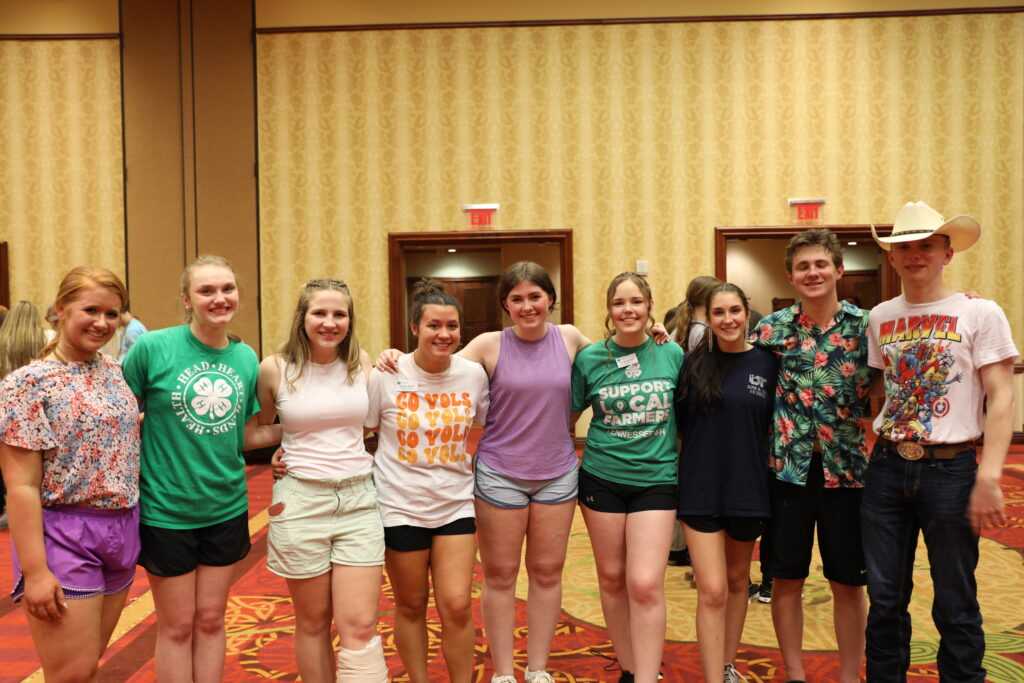
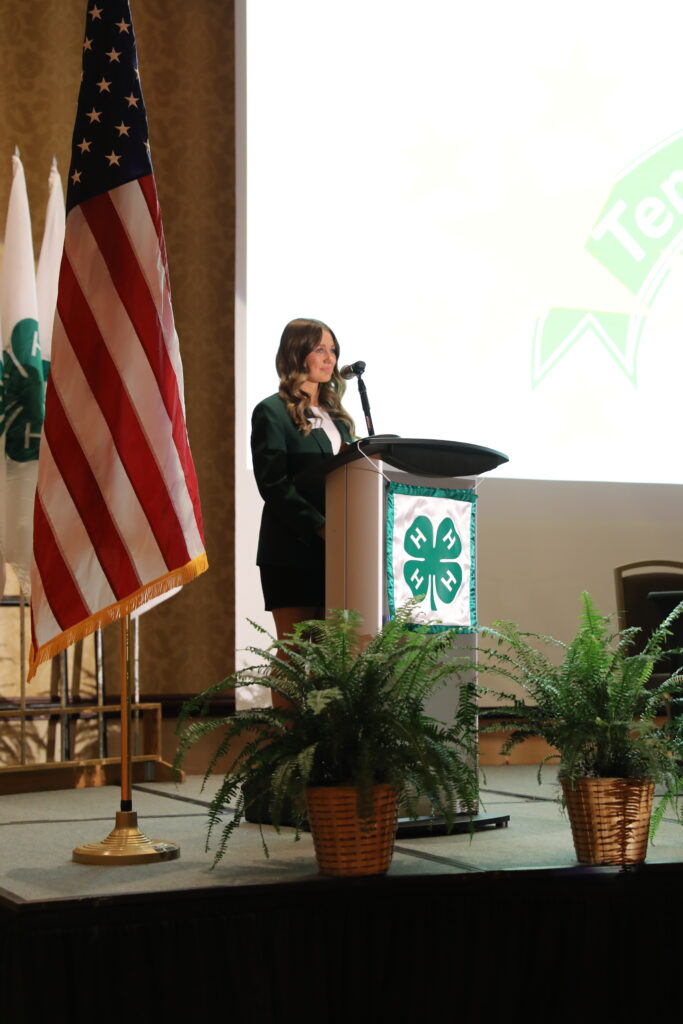
Registration
All registration for Tennessee 4-H Congress will be handled through your local UT Extension office.
The state registration deadline is December 3, 2025 but county deadlines may be earlier. If you’re interested in attending, contact your county 4-H agent for details and deadlines.
Before coming to State 4-H Congress, delegates and their parents or guardians must sign Form 600-A: 4-H Activity and Event Acceptance Form (available from the county Extension office or by downloading the F600A Form. When delegates sign this form, they are agreeing to follow all rules and guidelines for participation. All forms must be returned to your local extension office.
In support of youth development, Tennessee State University Cooperative Extension, the University of Tennessee Institute of Agriculture, and donors to the Tennessee 4-H Foundation provide scholarship opportunities for Tennessee 4-H members to attend Tennessee 4-H Congress.
This year, $7,590 in scholarship support will be awarded through 23 scholarships, each valued at $330. These scholarships cover the Congress registration fee but do not include transportation costs. Awards will be announced in February.
An information packet (available in Microsoft Word) describes each scholarship opportunity, including eligibility criteria and application requirements.
All applications must be submitted by Thursday, January 25, 2024, using the link provided in the packet.
Please review the packet carefully. If you have questions, contact your county Extension office or call Tennessee State University Cooperative Extension at 615-963-1351.
We encourage all eligible 4-H members to apply and look forward to reviewing your applications!
Preparing For Congress
Tennessee 4-H Congress is an activity that supports the Citizenship project and helps 4-H’ers develop the life skill of responsible citizenship. Citizenship is showing love, loyalty, and responsibility to your community and country. It means understanding both your rights and your duties as a citizen.
Citizenship includes:
- Loyalty to your community and state
- Understanding the rights and privileges of citizenship, such as voting and taking part in government
- Fulfilling your civic responsibilities
- Appreciating and valuing diversity
Being a responsible citizen starts with understanding how government works and how you can make a difference. In a democracy, government is created by the people and for the people. Active citizen participation helps ensure that government remains responsive and fair.
How much do you know about your government?
To make the most of your Tennessee 4-H Congress experience, take time to learn about how state government works—especially here in Tennessee. Explore books and trusted online sources to discover more. You’ll also find helpful links and resources on this website.
Ask yourself:
- Who are the leaders in Tennessee’s government?
- How are they elected?
- How does a bill become a law?
- What happens if the governor vetoes a bill?
Knowing the answers to these questions will help you step confidently into your role as a Tennessee 4-H Congress senator or representative.
4-H Congress will take place at the Embassy Suites Nashville SE in Murfreesboro on Saturday, March 7, 2026. The opening assembly will be held that evening.
Tennessee 4-H Congress will conclude on Tuesday evening, March 10, 2026, with the Citizenship Banquet followed by a farewell dance.
Delegates will depart on Wednesday morning, March 11, 2026.
Buses will be available for delegates from the Western and Eastern Regions. Specific schedules will be shared through each region’s staff. Please contact your county 4-H agent for details about transportation options.
Delegates from the Central Region should arrange for an adult to provide drop-off and pick-up at the event location.
Saturday, March 7, 2026
All delegates will be housed by region at the Embassy Suites Nashville SE, located at 1200 Conference Center Boulevard in Murfreesboro. The Embassy Suites will also serve as the official Congress headquarters.
Most meals will be special events sponsored by friends and supporters of 4-H. Delegates will be responsible for Sunday dinner and Wednesday breakfast on their own.
If parents or guardians need to contact a delegate during Congress, they may call the Embassy Suites Nashville SE at 615-890-4464.
Knowing what to wear for Tennessee 4-H Congress can be a challenge—especially if this is your first time attending. Remember, you are representing your county and the 4-H program. You’ll meet state officials, legislators, donors, and other guests, so it’s always better to be overdressed than underdressed.
The most important rule is simple: your appearance should always be neat, clean, and professional.
Use the following dress code guidelines to help you plan and pack for the event.
As a Tennessee 4-H Congress delegate, you serve as an ambassador for more than 184,000 4-H members across the state. Represent them well through your active participation, respectful behavior, and professional appearance throughout the event.
Remember:
- Be on time—or early—for every session and event.
- Listen carefully. Donors, university officials, and 4-H alumni will share valuable insights during Congress. Show respect and interest through your attentiveness.
- Keep cellphones put away during meals and assemblies.
- Express gratitude by writing thank-you notes to sponsors, leaders, agents, and parents.
- Share your experience when you return home. Take notes and be ready to give an engaging report of your Congress experience.
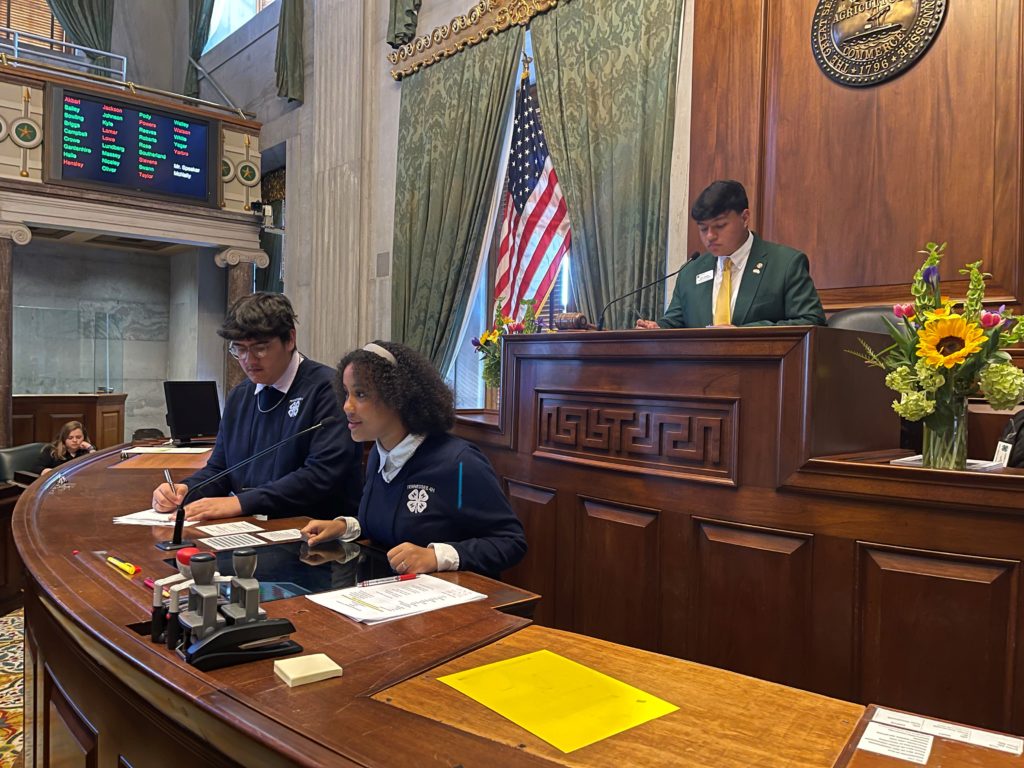
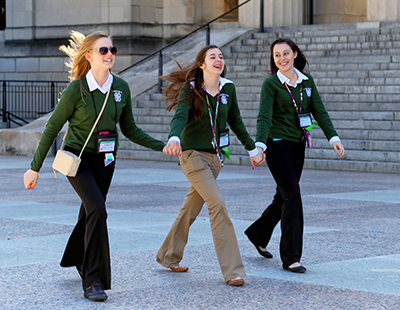
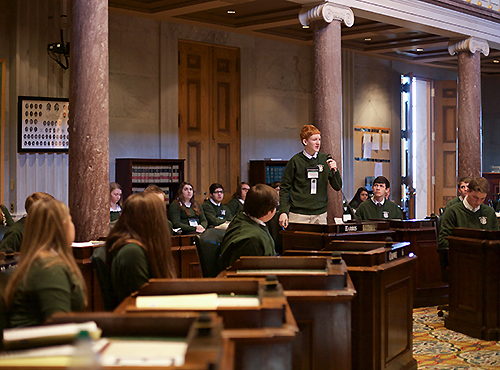
4-H Congress Competitions and Activities
Tennessee 4-H Congress offers a variety of experiences designed to strengthen leadership, communication, and citizenship skills. Delegates take part in competitions, elections, and service projects that showcase their talents and commitment to their communities. From portfolio submissions and public speaking to history challenges and hands-on service, each activity helps participants grow as leaders and engaged citizens.
Portfolios for 4-H Citizenship and Leadership competition are due into the State 4-H Office by January 30th. For a guide to assembling a 4-H portfolio, please click on the following link: 4-H Portfolios.
One of the highlights of Tennessee 4-H Congress is the election of state officers. Delegates get the unique opportunity to use real voting machines to elect the State 4-H Congress Governor, Speaker of the Senate, and Speaker of the House.
Before Congress, each region holds a caucus to nominate candidates for these offices. To be eligible to run, delegates must be approved by the State 4-H Office for membership in the Tennessee 4-H Honor Club.
After nominations, campaigning and elections take place during Congress. The newly elected officers are officially installed during the Citizenship Banquet on Tuesday evening.
Eligibility of Candidates
- A member of the current state 4-H council cannot run for a Congress office and cannot resign his/her current council position in order to be eligible to run for a Congress office.
- All candidates must be approved by the state 4-H office for membership in the Tennessee 4-H Honor Club.
- A candidate must be enrolled in the 9th or 10th grade on January 1 of the current year.
Each year one of the Congress highlights is the election of officers when delegates actually get to use voting machines to select their own State 4-H Congress Governor, Speaker of the Senate and Speaker of the House. A regional caucus is held prior to Congress to nominate candidates to run for office. To be eligible to run for a Congress office, delegates must be approved by the state 4-H office for membership in the Tennessee 4-H Honor Club. Following nominations, the election goes into full swing. Installation of the new officers is held at the final banquet on Tuesday night.
Eligibility of Candidates
- A member of the current state 4-H council cannot run for a Congress office and cannot resign his/her current council position in order to be eligible to run for a Congress office.
- All candidates must be approved by the state 4-H office for membership in the Tennessee 4-H Honor Club.
- A candidate must be enrolled in the 9th or 10th grade on January 1 of the current year.

Eligibility of Delegates
- All delegates must be duly registered in order to vote. To register, delegates will complete a voter registration form and receive back a voter registration certificate prior to election day.
- Current Congress officers are serving as leaders at Congress rather than delegates. Therefore, they should not register to vote. Likewise, public speaking, citizenship and leadership contestants, special acts and others who are not official Congress delegates should not register to vote.
- Only official voting delegates are eligible to serve as campaign managers or to take an active part in campaigning.
Voting
- Only senators vote for senators and representatives vote for representatives. Both senators and representatives vote for Governor.
- If there is a tie, delegates will vote in a run-off election.
- There will be no absentee voting.
Voting Reminders for Delegates
- You will receive a voter registration certificate at breakfast on Tuesday. You will not be allowed to vote without your certificate.
- You should be on time to vote. The polls open at 7:45 a.m. They will close at the time designated on the schedule.
- When you enter the polling area, check in at your region’s table. A volunteer will direct you to the correct machine.
- You will be using official voting machines for the elections. If you need assistance with operating the machine, a volunteer will be on hand to assist you.
- You must have your voter registration certificate punched by a volunteer working the election. Keep your certificate in case there is a run-off election. You must show your card (with the hole punched) in order to vote in a run-off election.
- For the first ballot, you will have two votes for each race. In case of a tie, there will be a second vote and you will vote for one person per race.
Campaign Material
- No campaign materials of any sort is allowed in the capitol.
- No campaign materials of any sort on tables at meals.
- No handouts, banners, or posters are allowed in the capitol or any assembly area – only that worn on the person is permitted.
- Each candidate will submit two campaign videos. Video requirements are:
- The videos should be 15 seconds and 45 seconds in length.
- Speakers should be in a quiet environment so the viewers can hear them.
- Try to video in a light, clean environment. Ensure the speaker is comfortable (not squinting, sweating, or in lighting that makes them washed out/ dark.)
- Do not wear any tight patterned shirts.
- When videoing on your phone, you must hold the phone HORIZONTALLY.
- Videos should be submitted to the regional 4-H program leader two weeks before Congress.
- Each candidate will also submit one powerpoint (or presenter) slide for campaign purposes.
- Slides will be created using a widescreen format (13.33 in W X 7.5 in H).
- Slides should be submitted to the regional 4-H program leader two weeks before Congress.
- Slides will be displayed on monitors in the hotel.
Speeches and Appearances
- Candidates for Speaker of Senate and House are given 3 minutes each at their respective Know Your Government sessions on Monday morning. Only the candidates may speak.
- Candidates for Governor are given 3 minutes each at the Monday evening assembly. Only the candidates may speak. Following the speeches, each candidate will answer a question asked by the Governor, drawn randomly from a pool of questions developed by the current Congress officers in conjunction with the state 4-H staff.
- In the case of a tie a run-off election will be held, and candidates for the contested race(s) will have a chance to give 1-minute speeches between ballots.
Judging Procedure
- There will be a separate division for each grade (9th, 10th, 11th and 12th).
- Members will present a prepared speech not to exceed seven minutes* in length and will give an extemporaneous speech not to exceed two minutes in length.
*For each 30 seconds the speaker exceeds the seven minute time limit, one point will be deducted from the final score. Five points will be deducted from the final score if the speech is less than three minutes in length. - The prepared speech will count 75% and the extemporaneous speech will count 25%. Form 656A will be used as the scorecard for the prepared speech and Form 657 will be used for the extemporaneous speech.
- Members may enter the citizenship or leadership awards program in addition to the public speaking contest.
Score Cards
- 4-H Public Speaking Score Card – Senior Division (F 656-A)
- 4-H Extemporaneous Public Speaking Score Card (F 657)
Awards
Region: One scholarship to State 4-H Congress for each of the two the top two 9th, 10th, 11th and 12th grade division winners. Sweaters will be provided for those who have not previously attended State 4-H Congress.

State: Each of the four first place winners (9th, 10th, 11th and 12th grade) receive an engraved bowl and a $100 cash award. The 12th grade winner will receive a $1,000 scholarship; and the 11th grade winner will receive a $500 scholarship. All other participants in the state contest receive a $25 cash award.
Donors
Tennessee Farm Bureau Federation (regional awards); Henry County Extension Staff (savings bonds); Lute Truett Memorial Fund (silver trays); friends and family of Lorna Norwood (college scholarship for 11th grade winner); family of Leon Foster (college scholarship for 12th grade winner)
2023 9th Grade Regional Public Speaking Winners
John Hancock – Wilson County (Central Region)
Sowmil Kumble – Williamson County (Central Region)
John Everett Martin – Knox County (Eastern Region)
Gracie Tindell – Union County (Eastern Region)
Catherine Gibson – Hardeman County (Western Region)
Marshall Woodall – Henderson County (Western Region)
2023 10th Grade Regional Public Speaking Winners
Gabe Harville – Smith County (Central Region)
Logan West – Macon County (Central Region)
Joshua Ransom – Johnson County (Eastern Region)
Meredith Whitley – Union County (Eastern Region)
Elisha Gaugh – Madison County (Western Region)
Isaac Welch – Wayne County (Western Region)
2023 11th Grade Regional Public Speaking Winners
Abigail Berny – Williamson County (Central Region)
Delia Marchant – Giles County (Central Region)
Olivia Castle – Washington County (Eastern Region)
Sophia Winauski – Sevier County (Eastern Region)
Haley Aldridge – Crockett County (Western Region)
Amelia Langford – Dyer County (Western Region)
2023 12th Grade Regional Public Speaking Winners
Allen Jones – Robertson County (Central Region)
Britta Gaetjens – Putnam County (Central Region)
Addie Brooks – Claiborne County (Eastern Region)
Cloe Murray – Roane County (Eastern Region)
Maddie Grace Thierfelder – Madison County (Western Region)
Chris Smith – Dickson County (Western Region)
* State Winner
4-H History Bowl
During the History Bowl, all three regions will have teams on stage at the same time. The competition will be conducted in two parts.
Part I
- There will be a pool of 12 questions with each team having the opportunity to answer four questions each without any competition from the other teams.
- The questions will be rotated between the regions. For example, the Western Region will have one question, then the Central Region, and the Eastern Region until all regions have had the opportunity to answer a question for a total of 12 questions.
- A correct answer is worth 10 points, and an incorrect answer will result in 10 points deducted from the team’s score. There is not penalty for an unanswered question.
- After the question is read, the team will have five seconds to answer.
- Scores earned in Part I will be added to scores earned in Part II to determine the winner.
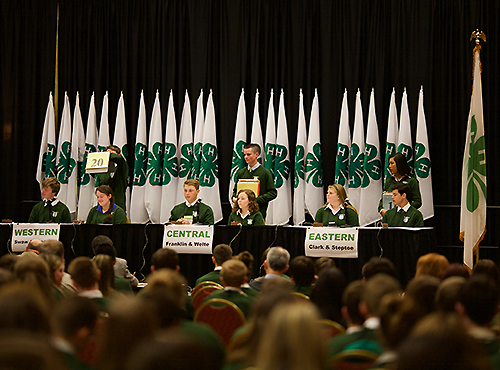
Part II
- Each team will be seated at a table with a signal box. When a question is asked, the first team to press its signal button will have the opportunity to answer the question. The team whose signal light is activated will have the opportunity to answer the question even if another team answers without their signal light lit. After one signal button is pressed, no other signal will register. Be sure your signal is lit before providing an answer.
- The team with the activated signal will have five seconds in which to give an answer. Either member of the team may press the signal button and either may answer the question, but it would be wise for one team member to be sure of the answer before flashing the signal.
- If the signal button is pressed before the question is completed, that team must answer with no further information given.
- Correct answers are worth 10 points each. An incorrect answer or failure to answer after a team has turned on its signal light will take 10 points from a team’s score. There will be no partial credit for a question.
- A team that has negative 50 points drops out of the contest.
- The contest will continue until one team has either scored 200 points or the 30-minute timeframe has been reached, whichever comes first.
- If two or more teams are tied when time is up, a question will be asked to break the tie (other teams are not eligible).
- Scores will be kept digitally and projected onto the screen for the audience to see.
Awards
The two individuals making up the state-winning History Bowl team will receive engraved plaques and a $50 cash award. All other participants will receive a $25 cash award.
Donor
Janet Cluck, Dickson County
2023 Regional Winning History Bowl Teams
Western Region:
- Cruz Martinez, Obion County
- Paige Temple, Madison County
- Alternate: Alexandria Foster, Hardeman County
Central Region:
- Jalyn Baker, Giles County
- Emily Chamberlin, Robertson County
Eastern Region:
- Alyssa Hatcher, Jefferson County
- Lyla Finch, Jefferson County
- Alternate: Jackson Hall, Jefferson County
* State Winner
4-H History Bowl Bibliography
- 4-H Tennessee Tradition. Knoxville, Tennessee: State 4-H Office, 1987.
- Tennessee Blue Book. Nashville, Tennessee: Secretary of State, Capitol Building, Nashville, Tennessee 37219.
- Tennessee State Symbols, Simbeck, Rob, Altheus Press, Nashville. (Available in most book stores and public libraries.)
- Current events in Tennessee (daily newspapers, etc.)
- Tennessee State Homepage
History Bowl Sample Questions
- Who is the University of Tennessee Vice President for Agriculture?
- What is the name of Andrew Jackson’s home near Nashville?
- What is the only county in Tennessee named for a woman?
- Who designed our State Capitol?
- Give the names and home towns of our two US senators.
- Who is the most recent Tennessean to be a candidate for president of the United States?
- Who wrote the song “Rocky Top?”
- Each governor of Tennessee has been a member of one of three different political parties. What party other than the Democratic and Republican parties did some of our governors belong to?
- Who was the only person to serve as governor of the state of Franklin?
- Where in Tennessee was the first newspaper in the United States devoted to ending slavery published?
- Who established the first 4-H Clubs in Gibson County?
- What was the first name of Tennessee’s Collegiate 4-H program?
- What Tennessee town was the first in the United States to be named for George Washington’s wife?
- What is the name of the professional organization for Tennessee 4-H agents?
- Who was the first native born Tennessee governor?
- Eight counties are not named for men – name at least five of these.
- Who is the chief executive of Tennessee? (name)
- Who is the speaker of the Tennessee Senate?
- How many justices are there on the Tennessee Supreme Court?
- What is a governor’s “power of veto?”

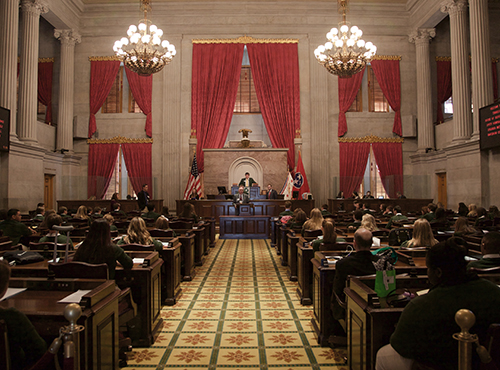
While in the state capitol, delegates to Tennessee 4-H Congress have the opportunity to sit in the seat of their elected officials to the state legislature and vote on a bill. Delegates should study the bills and resolutions before their legislative session. They will have the opportunity to state their views and try to influence their peers regarding the bills introduced during the “Know Your Government” sessions of Congress.
Bills and the Resolution
Judging Procedure
- There will be two divisions, senior Level I (9th and 10th grade) and senior Level II (11th and 12th grade).
- Senior Level I (9th and 10th grade) awards will be based on the member’s project achievement portfolio counting 50% and a project interview counting 50%.
- Senior Level II (11th and 12th grade) awards will be based on the member’s project achievement portfolio counting 50% and a project interview counting 50%.
- During the interview, all participants (Level I and Level II) will be seated at a table, facing the judges. The only persons in the room during the interview will be the person being interviewed and the judges.
- Level I (9th and 10th grade) participants will be interviewed through questions only. Level I participants are not to use any visuals, but a resume instead. Please note: This is new for 2018. Contestants will need to bring four (4) copies of their resumes with them.
- Level II (11th and 12th grade) participants will be interviewed through questions only. Level II participants are not to use any visuals. The judges will be provided with a copy of each finalist’s resume from their project achievement portfolio. Contestants are encouraged to bring copies of their resumes to the interviews.
Score Cards
- Tennessee 4-H Portfolio Score Card/Rubric/Comments Page (F 633)
- Tennessee 4-H Interview Judging Score Card – Senior Level I (F 638-A)
- Tennessee 4-H Interview Judging Score Card – Senior Level II (F 638-B)
Donors
| Tennessee Farm Bureau Federation (scholarships to State 4-H Congress and trip to National 4-H Congress); Ieula Lee Endowment Fund (silver trays); Lori Gallimore (Horizon Award); Albert Gore, Sr. Memorial Endowment Fund (Level II educational scholarship); UTK College of Agricultural Sciences and Natural Resources (opportunity for Level I college scholarship); UTK College of Human Ecology (opportunity for Level I college scholarship); and UTM School of Agriculture and Applied Sciences (opportunity for Level I college scholarship) |
2023 State Level I Citizenship Finalists
- Caroline Garrell – Lincoln County (Central Region)
- Logan West – Macon County (Central Region)
- Gracie Tindell – Union County (Eastern Region)
- EmiLee Lassiter – Warren County (Central Region)
- Reeva Lalani – Williamson County (Central Region)
- Shelby Thames – Williamson County (Central Region)
2023 State Level 1 Citizenship Alternates
- 1st alternate: London Christian – Shelby County (Western Region)
- 2nd alternate: Allison Keeler – Knox County (Eastern Region)
2023 State Level II Citizenship Finalists
- Callie Smith – Jefferson County (Eastern Region)
- Mason Valentine – Jefferson County (Eastern Region)
- Ella Flynn – Macon County (Central Region)
- Abigail Barnett – Sumner County (Central Region)
- Hattie Martinek – Sumner County (Central Region)
- Alivia Haylett – Williamson County (Central Region)
2023 State Level II Citizenship Alternates
- 1st alternate: Hope Collins – Madison County (Western Region)
- 2nd alternate: Jeremiah Tindell – Union County (Eastern Region)
* State winner
Judging Procedure
- There will be two divisions, senior Level I (9th and 10th grade) and senior Level II (11th and 12th grade).
- Senior Level I (9th and 10th grade) awards will be based on the member’s project achievement portfolio counting 50% and a project interview counting 50%.
- Senior Level II (11th and 12th grade) awards will be based on the member’s project achievement portfolio counting 50% and a project interview counting 50%.
- During the interview, all participants (Level I and Level II) will be seated at a table, facing the judges. The only persons in the room during the interview will be the person being interviewed and the judges.
- Level I (9th and 10th grade) participants will be interviewed through questions only. Level I participants are not to use any visuals, but a resume instead. Please note: This is new for 2018. Contestants will need to bring four (4) copies of their resume with them.
- Level II (11th and 12th grade) participants will be interviewed through questions only. Level II participants are not to use any visuals. The judges will be provided with a copy of each finalist’s resume from their project achievement portfolio. Contestants are encouraged to bring copies of their resumes to the interviews.
Score Cards
- Tennessee 4-H Portfolio Score Card/Rubric/Comments Page (F 633)
- Tennessee 4-H Interview Judging Score Card – Senior Level I (F 638-A)
- Tennessee 4-H Interview Judging Score Card – Senior Level II (F 638-B)
Donors
Tennessee Farm Bureau Federation (scholarships to State 4-H Congress and trip to National 4-H Congress); Ieula Lee Endowment Fund (silver trays); Ray and Carolyn Humberd (Horizon Award); Albert Gore, Sr. Memorial Endowment Fund (Level II educational scholarship); UTK College of Agricultural Sciences and Natural Resources (opportunity for Level I college scholarship); UTK College of Human Ecology (opportunity for Level I college scholarship); and UTM School of Agriculture and Applied Sciences (opportunity for Level I college scholarship)
2023 State Level I Leadership Finalists
- Lilly Anglin – Carter County (Eastern Region)
- MaeLee Williamson – Giles County (Central Region)
- Zac Ross – Knox County (Eastern Region)
- Brinlee Bradford – Lincoln County (Central Region)
- Levi Cullum – Williamson County (Central Region)
- Sowmil Kumble – Williamson County (Central Region)
2023 State Level I Leadership Alternates
- 1st alternate: Tessa Palma – Robertson County (Central Region)
- 2nd alternate: John Everett Martin – Knox County (Eastern Region)
2023 State Level II Leadership Finalists
- Bristol Brown – Anderson County (Eastern Region)
- Amelia Langford – Dyer County (Western Region)
- Delia Marchant – Giles County (Central Region)
- Jonathan Tindell – Union County (Eastern Region)
- Cade Simmons – Van Buren County (Central Region)
- Reece Chandler – Weakley County (Western Region)
2023 State Level II Leadership Alternatives
- 1st alternate: Dawson Harvey – Williamson County (Central Region)
- 2nd alternate: Sarah Gilford – Carter County (Eastern Region)
* State winner

Delegates to the 2025 Tennessee 4-H Congress are being challenged to donate items to the Store. The Store provides free groceries and basic necessities to those in need, with a focus on providing dignity and respect to its clients.
We strongly encourage counties to promote this service project countywide, not just with county 4-H Congress delegations.
Tennessee 4-H Congress Related Links
- State of Tennessee Homepage
- The Tennessee General Assembly
- Tennessee Blue Book
- Metro Nashville Davidson County Government
- Nashville Area Chamber of Commerce
- General Jackson Riverboat
- Tennessee 4-H Awards and Recognition Handbook (State Events)
- Tennessee 4-H Awards and Recognition Handbook (State Congress Awards Programs)

Volunteer Orientation Information | Volunteer Expectations | Awards and Recognition Handbook | Volunteers at Out-of-County Events
